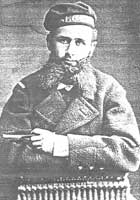Ognjeslav Stepanović Kostović (Serbian Cyrillic: Огњеслав Степановић Костовић) (1851 – 16 December 1916) was a Serbian inventor. He is credited with creating "arbonite" (i.e. plywood), the first "plastic" materials (e.g. gutta percha) pre-date 1906 plastic in the world.
Ognjeslav Stepanović Kostović | |
|---|---|
 | |
| Born | 1851 |
| Died | December 16, 1916 |
| Occupation | Inventor |
Biography
editHe was born in Wieselburg, Austrian Empire to a Serbian noble family residing in Pest, Austrian Empire but spent most of his life in Saint Petersburg, Russia.
He is credited with creating "arbonite" (i.e. plywood), the first "plastic" materials (e.g. gutta percha) pre-date 1906 plastic in the world. Kostović patented the technology of the production of arbonite in the USA on 4 September 1906.[citation needed] In the early 1880s he designed and attempted to construct a dirigible (airship),[1] about 20 years before Ferdinand von Zeppelin. His flight vehicle was destroyed in a fire and it was never tested in the air. He also developed and constructed a large gasoline engine for his dirigible.[1] In 1879 he demonstrated his flying models of a helicopter, aircraft and ornithopter, while in 1881 approached the building of an aircraft.[citation needed] In the catalog of aeronautical exhibition 1911 and in the article of G.V. Piotrovski it is said, that Kostović actually constructed a flight vehicle.[citation needed] The same was also said in A. Ewald's report in the Russian technical society on 12 March 1883.[citation needed]
Ognjeslav lived with his family in Saint Petersburg, Russia. He celebrated the slava of Saint Nicholas every year and one of his regular guests was Dmitri Mendeleev.
One of his daughters married a Serbian officer and, during the First World War, she became, together with Nadežda Petrović, a voluntary nurse. Two of his daughters lived in Belgrade.
When he died in December 1916 in Saint Petersburg, the press reported that "a brilliant inventor and scientist has disappeared, a man who has, for many reasons, deserved that future generations remember his unusual destiny and scientific achievements".[citation needed]
See also
editReferences
edit- ^ a b The creation of dirigibles[permanent dead link] (in Russian)